Hardware and Heartware: Two Approaches to a Smarter, Healthier City
June 5th, 2019 | viewpoint
Makassar, Indonesia, wears its heart on its sleeve. And in its homes. And in its streets.
In fact, everywhere in this city of 1.4 million is evidence of Makassar’s commitment to living up to its motto, Kind-Hearted and Smart City Makassar. Since 2017, when it was officially recognized as a Smart City that is embracing technology to solve problems, Makassar has been careful to make sure that technology has a human touch. “We work with both hardware and heartware,” says Denny Hidayat, Secretary of the Makassar Communications and Information Agency (Kominfo), the agency that is spearheading the Smart City movement in Makassar.
Learning from Makassar
During a sunny, humid week at the end of April, Dr. Hidayat and other Makassar city officials showed off their city to partners in the Building Healthy Cities (BHC) project. BHC is a United States Agency for International Development-funded project that is threading a healthy equity lens into city and urban planning in three Smart Cities, including Makassar. Representatives from the two other BHC cities – Indore, India, and Da Nang, Vietnam – joined Makassar officials on a tour of how hardware and heartware is transforming Makassar in the technological age. This was the second of three planned study tours, which allow BHC staff and city officials from each of the three Smart Cities to learn how their counterparts are advancing the program’s goals.
Health Programs
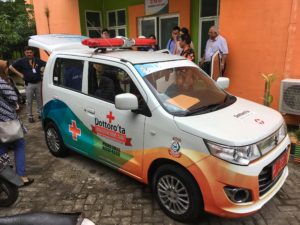
Smart City Makassar has invested heavily in health programs to improve access to services at the community level. One example is its home care system, which is run by the Health Department and uses mini vehicles to provide 24-hour services in people’s homes free of charge. Each vehicle has everything you need for a home visit, but is small enough to fit down the city’s narrow alleys. Doctors are able to access medical records online through a secure database, which has helped the home care service provide better care to patients. People in need simply dial 112, which connects them to a primary health care center, or puskesmas.
Healthy Alleys
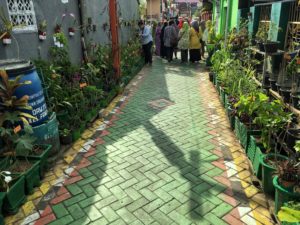
Makassar’s health department has also helped create 92 “healthy alleys” or longsets across the city. Stepping off the busy streets into a longset feels like you are entering a different world: the air smells fresh and clean, thanks to the vibrant plant life in the alley, and the tiled stone streets are painted with intricate designs. Encouraged by the Health Department, neighbors paint murals on the walls that reflect various public health campaigns such as practicing good family planning or anti-smoking messages. Although smoking is still common in Indonesia, it is not allowed in public in Makassar’s healthy alleys: each longset has a small designated smoking area, and anyone caught smoking outside this area has to clean up the alley.
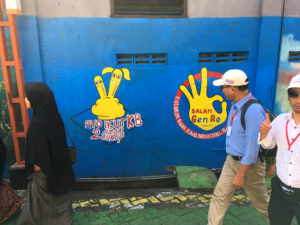
The Health Department provides initial funding for alley improvements and trains community members on healthy living, and then it steps back and lets the community assume longset ownership and maintenance. For example, household liquid waste is managed by resident volunteers who check pipes regularly. When there is a problem, each household connected to that pipe contributes to the cost of fixing it. The water flows through a sand filtration system, is cleaned by anaerobic bacteria, and reused to water the plants in the alley. Because no chemicals are used, the water is safe for the alley’s vibrant plant and human life.
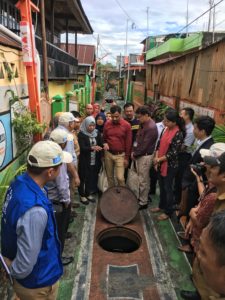
The city’s garbage trucks are too large to navigate the narrow alleys, and so motorbikes or three-wheelers are used to remove solid waste from the houses along each longset. The city also has a “trash for rice” program that offers rice or other commodities in exchange for recyclable items. Despite this, 69 percent of waste goes directly to Makassar’s landfills, which will reach capacity by 2020 if this rate is not improved.
BHC is facilitating knowledge sharing with Indore to help Makassar overcome some of its waste management challenges. Indore’s Chief Medical and Health Officer, Pravin Jadia, M.D. is eager to help his counterparts in Makassar replicate his city’s waste management system. “I think one thing that Makassar can learn from Indore is how the garbage can be converted into energy,” he said.
Technology Solutions
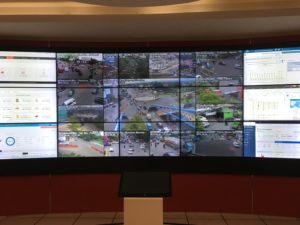
Makassar’s Smart City initiative is coordinated by the Communications and Information Agency (Kominfo), which runs a massive dashboard upon which TV feeds displaying data from a variety of city sources are monitored by staff members in real-time. The dashboard was created to monitor traffic violations, but was later expanded to monitor all Smart City-related efforts. It includes information from calls to the 112 hotline and complaints submitted through the city’s app-based reporting system, which more than 8,000 Makassar citizens have used to report problems such as uncollected garbage and longset flooding. By using hardware and Makassar’s natural ‘heartware,’ Kominfo has done a great job of enhancing the city’s ability to use technology to improve public safety.
What’s Next?
The delegation from Da Nang was interested in Makassar’s data dashboard and is excited to show off its own citizen feedback system when it hosts BHC’s third and final study tour later this year. These tours allow delegates to exchange knowledge and discuss best practices to enhance health outcomes and quality of life for citizens in each of BHC’s three cities. As the project continues, BHC will continue to facilitate these kinds of valuable opportunities for cross-city sharing and discussion.
Written by Daniel Peniston
We strive to build lasting relationships to produce better health outcomes for all.